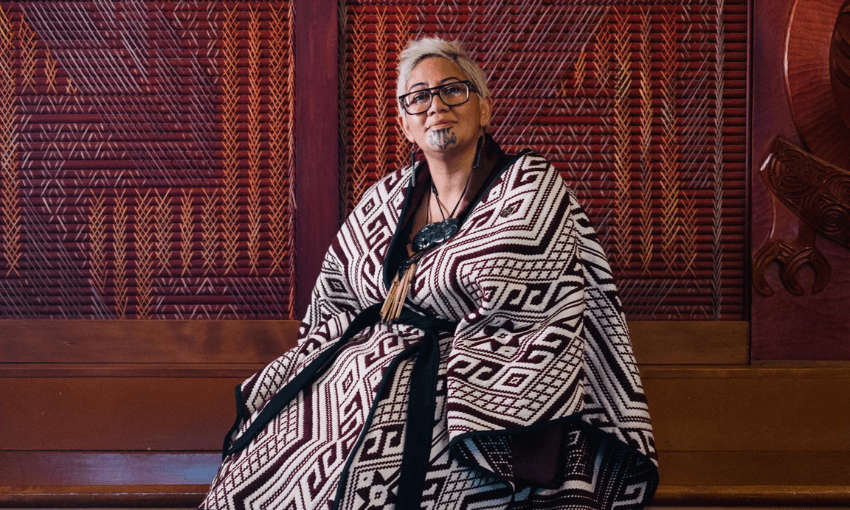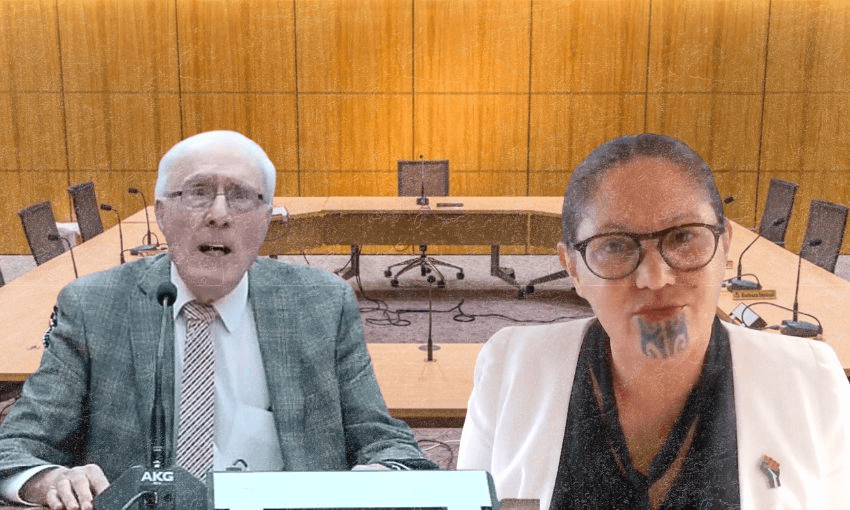Politics reporter Lyric Waiwiri-Smith and Ātea editor Liam Rātana pay tribute to Tāmaki Makaurau MP Takutai Moana Natasha Kemp, who died in the early hours of this morning.
Takutai Moana Natasha Kemp was a relatively quiet person, at least in the public eye. Throughout her election campaign, time in parliament, and media interviews, Kemp had a humble yet assured presence. She spoke eloquently but was never pretentious. What was clear to all, however, was her passion for advocating for Māori.
A first-term MP for Te Pāti Māori, Kemp celebrated her 50th birthday party over Matariki weekend. She revealed last July that she was suffering from kidney disease, and took six weeks’ leave from parliament. At her time of death, Kemp was awaiting a kidney transplant.
Of Ngā Rauru, Ngā Iwi Mokai Patea, Ngāti Tamakopiri, Ngāti Whitikaupeka, Ngāi Te Ohuake, Ngāti Hauiti, Ngāti Paki, Ngāti Hinemanu and Ngāti Tūwharetoa descent, Kemp was the eldest child of Clark Karaka Kauika-Stevens and Ngaire Anne Te Hirata Kauika-Stevens, nee Steedman. She was named Takutai Moana after her father’s mother, Takutai Moana Nora Wirihana Tawiki – a name she received when she was baptised as a mōrehu of the Rātana faith. Kemp was raised by her nana Takutai and grandfather Temanea Turereao Sonny Kauika-Stevens, who helped raise 24 children in total, including six of their own and several of Kemp’s father’s first cousins.
“I was brought up with them and they are my village,” Kemp said in her maiden speech to parliament in 2023.
Kemp’s father enlisted in the Corps of the Royal New Zealand Engineers and was posted to Linton army camp in 1977. Kemp and her whānau travelled from Marton to Singapore as her father served, before she returned to Takirau marae in the Waitōtara Valley, South Taranaki, to be raised by her grandparents at seven years old. Kemp attended Ngamatapouri School and it was here she was immersed in tikanga and te ao Māori.
“Everything I know can be attributed to my upbringing at Takirau marae, our whānau, our ahi kā.”
At 11 years old, Kemp returned to the care of her parents and attended Monrad Intermediate School at Palmerston North. It was here she strengthened her connection to the Rātana church. Her grandfather Sonny Kauika-Stevens and great-grandfather Paora Hekenui were both apostles of the church. Her grandfather’s mother Huatahi Peina Hawira and great-grandfather’s sister Mariana Hekenui were both part of the group that travelled with Tahu Potiki Wiremu Rātana on his world tour in 1924.
By age 14, Kemp and her whānau were living in Tāmaki Makaurau. After high school, Kemp went on to study at Auckland University and Te Wānanga o Raukawa, with a focus on anthropology, health, education and mātauranga Māori. After this, she began working as a community health worker supporting teenage hapū māmā for Putea o Pua midwifery support services in Ōtāhuhu. It was here Kemp met prominent Māori activist Syd Jackson, who began to mentor her.
In 1995, Kemp had her son Temanea Ereru Kauika-Quinlan. Her daughter Tania-Jade Waimarie Kauika-Fairbrother was born two years later in 1997. Kemp then founded and led the Rangatahi Mental Health Youth Hub in partnership with the University of Auckland, serving as chief executive for 13 years. The service delivered sexual health education in schools, alternative education, intermediate kura and wharekura. It also established the suicide prevention programme Talk 2 Me.
“Here, I learnt the true value and love for working with rangatahi and the takatāpui community,” said Kemp in her maiden speech. “I encouraged rangatahi to stand proud, that they had a voice, that they mattered, and that they were valued.”
As Kemp’s children grew up, they developed a love for hip-hop dance, which led Kemp to get involved too. She was the head of Hip Hop International, a dance programme for rangatahi, and served as director of Dziah Dance Academy from 2007 to 2015, during which time it gained global recognition, and became the first dance crew to represent Aotearoa at the World Hip Hop Dance Championships in the United States. In 2021, Kemp was appointed an Officer of the New Zealand Order of Merit for services to street dance and youth as part of the Queen’s Birthday honours.
“We always said hip hop saved our lives as a whānau, and Dziah was that life and a lifestyle for us,” Kemp said during her maiden speech.
Prior to entering parliament, Kemp served as chief executive of Manurewa Marae – a role she took up in August 2019. Her time at the marae was spent on the frontlines, helping whānau in need of food, housing and healthcare – especially during the Covid-lockdown period. While Kemp was at the helm, the marae established one of the largest foodbanks in South Auckland and administered more than 65,000 vaccinations during the pandemic.
This work was honoured by Labour’s Arena Williams, MP for Manurewa, who appeared puffy-eyed alongside caucus colleagues Peeni Henare, Carmel Sepuloni and Willie Jackson in parliament this morning. Williams and Kemp were close, having first met in 2011 when Williams was 21 years old, and Kemp was leading a dance group for rangatahi in what would become Williams’ electorate.
“It was a group of people who had struggles with school – these were young women, young men who wanted somewhere to be themselves and to find something,” Williams said. “They loved that it was something creative – she created this space for them where they could see a future in the creative arts in Aotearoa… She was someone who always had an open door for young people.
“There will be a lot of South Aucklanders who really feel this, [who] will really miss having someone like this. It’s time for all of us to come together to support one another, to keep fighting for those things that she believed in: whānau wellbeing, people finding a place for themselves no matter what their background [is].” Williams said Manurewa Marae will be used as a connector for the community.
Takutai Moana Natasha Kemp winning the Māori electorate of Tāmaki Makaurau was one of the biggest upsets of the 2023 election. Knocking the incumbent, senior Labour MP Peeni Henare, off his perch was no small feat, as he had held the seat for nine years. Kemp won the electorate by a slim margin of 42 votes.
Kemp’s success was not without controversy, with questions asked about the appropriateness of Manurewa Marae being used as a polling booth at the 2023 election, given the Tāmaki Makaurau candidate’s position there. In June 2024, allegations emerged that census and Covid-19 vaccine data collected by Manurewa Marae staff had been misused to help Kemp’s campaign. The subsequent inquiries found it was likely “on balance” that some photocopying of census data had occurred. In May this year, police referred a complaint relating to Manurewa Marae to the Serious Fraud Office.
In the political arena, having to campaign against someone does not always promise a built-in feud – often, unlikely friendships can grow, particularly between Māori. Henare had only just yesterday spent an hour with Kemp, bringing the youth MP assigned to him to meet her and share in her political experience and advice.
“When you campaign together, when you work in a community together, you become more than colleagues – she called me ‘brother’, and I called her ‘sister’, and that’s how it was,” Henare said. He hadn’t yet begun thinking about the byelection that Kemp’s death will trigger in Tāmaki Makaurau.
Labour MP Willie Jackson described the situation as “catastrophic”. “We contest politically, but it doesn’t take away – particularly in Māori politics – how close you get, still, even though we might be tough on each other on the campaign,” Jackson said. “She didn’t think she was seriously ill. Every time you asked her: ʻoh, I’m good!’… I don’t think she thought that it was coming at all.”
Acting prime minister David Seymour and the Act Party acknowledged Kemp’s death with “great sadness”. “She is gone far too soon and our thoughts are with her whanau and Te Pāti Māori colleagues. Farewell, and may you rest in peace.” The prime minister, Christopher Luxon, who is currently in Europe, said his thoughts were with Kemp’s “whānau, friends, colleagues, and the Tāmaki Makaurau community”.
While Kemp did sometimes require a walking stick to navigate the parliament buildings – all those stairs and hallways getting in the way of speaking truth to power – and often moved slower than the rest of her parliamentary colleagues, she continued to show up for the kaupapa until her last day, having sat through the proceedings of the House just hours before her passing.
Māori development minister and whanaunga of Kemp, Tama Potaka, led tributes in the House of Representatives this afternoon. Connected by shared whakapapa through Mōkai Pātea, Potaka said his “sister” embodied the sentiment of the late Kīngi Tuheitia to “be Māori all day, every day”. He acknowledged her love of kanikani, moana and whenua, her work at Manurewa Marae and with rangatahi. “You are bringing tears to my eyes and sadness to my thoughts,” Potaka said.
Green Party co-leader Chlöe Swarbrick remembered Kemp’s smile, and seeing her at Ponsonby pride parade earlier this year, after Kemp took time off from parliament to seek medical treatment – the two bonded over plans to restore the Waitematā Harbour and Hauraki Gulf. “She knew where she came from, and she knew where she was going, but more than that, she knew who would come after and she actively nourished their creativity and their compassion,” Swarbrick said. Her death was a grave reminder of “how fragile life is, but how the great stabiliser can indeed be love and integrity”, she said.
NZ First deputy leader Shane Jones led a waiata for Kemp, and reminded the House that “politics is a contest, but at the base of politics is the pursuit of humanity”. Gesturing towards her empty bench, covered in a Te Pāti Māori flag and flowers, Jones spoke to Kemp directly: rest, and leave the work you have progressed to those you have left behind. She had gone far too young, he said.
Kemp is survived by her two children and mokopuna.






